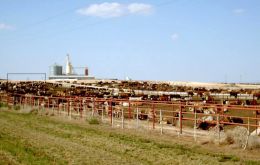MercoPress. South Atlantic News Agency
Tag: greenhouse gas emissions
-
Wednesday, September 10th 2014 - 06:28 UTC
Greenhouse gases in atmosphere reached a record high in 2013 says WMO

The amount of greenhouse gases in the atmosphere reached a record high in 2013 driven by a surge in the level of carbon dioxide, the World Meteorological Organization said on Tuesday, urging international action to combat climate change.
-
Thursday, September 26th 2013 - 21:19 UTC
FAO believes livestock greenhouse gas emissions could be reduced as much as 30%

Wider use of available best practices and technologies could help reduce greenhouse gas emissions from the livestock sector by as much as 30%, according to a new study released on Thursday by the United Nations Food and Agriculture Organization, FAO.
-
Saturday, November 24th 2012 - 21:59 UTC
Why the Qatar Summit could bring new direction for action on climate change

By Lord Hunt & Terry Townshend - We have learnt to expect surprises at UN climate change summits. At Durban, a year ago, there was the unexpected, but welcome, agreement to begin negotiations on a new legally binding instrument involving all major emitters of greenhouse gases, to be finalised by 2015, and to take effect in 2020.
-
Thursday, June 21st 2012 - 05:07 UTC
UK largest corporations will have to report greenhouse-gas emissions in profit reports

UK Deputy Prime Minister Nick Clegg announced that starting next April, all companies that list on the London Stock Exchange will be required to publish their greenhouse gas emissions in corporate earnings reports.
-
Monday, December 12th 2011 - 05:11 UTC
Happy ending for Durban climate summit: Kyoto Protocol extended to 2017

Climate negotiators agreed a pact that would for the first time force all the biggest polluters to take action on greenhouse gas emissions, but critics said the action plan was not aggressive enough to slow the pace of global warming.
-
Saturday, July 16th 2011 - 07:11 UTC
IMO agrees mandatory energy efficiency measures for international shipping

The International Maritime Organization (IMO) agreed on Friday on energy efficiency design standards for new ships to cut greenhouse gas emissions, but developing countries will probably delay implementation by using a waiver, delegates said.
-
Monday, June 28th 2010 - 22:16 UTC
Reducing meat and milk consumption helps lower greenhouse gas emissions

Reducing the consumption of meat and dairy products and improving agricultural practices could decrease global greenhouse gas emissions substantially. By 2055 the emissions of methane and nitrous oxide from agriculture could be cut by more than eighty percent, researchers of the Potsdam Institute for Climate Impact Research find.
